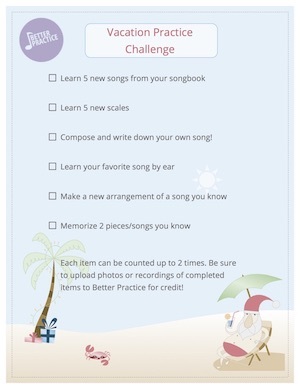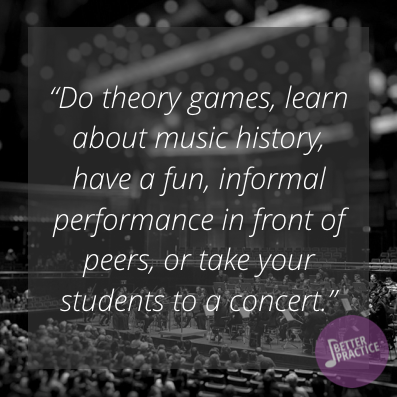Vacation time – it can be a time of relaxation, recharging, and, for a lot of music teachers…reduced income. Many students take breaks from lessons during summer/holidays and sometimes we don’t know if they’re ever going to come back at all! Taking a break (for both teacher and student) is healthy for the mind and body, but we don’t want students to go weeks (or months) without practicing at all. Family schedules can vary during breaks, so getting the usual, regular practice in might be a challenge. One way to sidestep this is to temporarily change goals from the usual curriculum, instead keeping things light so the student doesn’t feel too much stress from ‘having’ to practice but is continuing to learn from fun projects! Breaks are also a good opportunity to allow the child to learn something at their own pace. Here are some ideas on keeping students interested and their skills fresh.
1. Give them a list of things they could work on during the break, and tell them to finish at least X number of items on it. Make it fun! You could set up a raffle and say for each item they finish, they will get their name entered. Or, have prize categories for every so number of items completed. You can use an app like Better Practice™ to actually track completion of these goals and the student can upload their assignments/recordings/videos as they go.
Download our Vacation Practice Challenge list here:

2. Have them send recordings. With an app like Better Practice™, you can easily keep in touch with your students and have them send you recordings of their practice every week, even if you don’t see them. This way, you can make sure they’re staying on track and give them quick suggestions. If you close your studio for breaks, provide incentive for regularly sending recordings by using the raffle idea again: every week that a student sends a recording, they get their name entered in a raffle.
3. Give them a project to work on at their own pace. This can be things like learning songs they really like (such as a pop song or a movie song) by ear. This is especially good for those who have never transcribed before – they come back with a new skill and experience in listening. Or, if they’ve done this already, you can teach them possible ways to arrange a song and tell them to come back with an arrangement (and that you can teach them more things like this when they come back, if they really enjoy it!). Students tend to be very drawn to improv and learning to make their own music, so it makes for a great “fun” project.
For more advanced students, especially those learning jazz, give them a transcription to do. Have them learn a solo of one of their favorite artists: a great learning experience and a necessary skill for a jazz musician. In one of my jazz combo classes, our teacher gave our group a recording of a song to learn over break. Each student was to learn to play like the musicians in the recording, to learn their unique motifs and patterns, and be able to imitate them. When we got back from our break, we would play through the song as a band, hopefully sounding close to the recording. This was incredibly effective because 1. we had the pressure of letting down the rest of the band if we didn’t practice, 2. we wanted to come back and hear how it sounded together, and 3. we learned a lot from actively listening. Plus, it was really cool and rewarding to hear it come together!
4. Run a studio-wide competition. Practice time drops in the summer – students go on vacation, take a 3-month “break”, or simply get lazy. Keep your studio running and run a practice competition with a grand prize to reward those who stay in lessons and/or keep practicing. In the months leading up to this, hype it up! Make it a big annual thing that students know to look forward to. You can use Better Practice™ to log everyone’s practice times – even those that take a short break can keep logging their practice from home, so they have more reason to practice and return to the studio. The longest you should run these competitions is about 30 days – if it drags on too long, people may get impatient or the hype will die down. You could do multiple competitions for the summer months you find to be the lowest in practice, or just do one right in the middle of that period.
5. Run a summer camp. If you want a more sparse summer schedule while maintaining a lot of students, consider this idea. You can run a 1-4 week long camp with as big a group as you want to manage at a time. This is a great opportunity to teach things outside of just learning pieces – do theory games, learn about music history, have a fun, informal performance in front of peers at the end, take them to a concert, etc. Joy Morin of Color In My Piano has a great article on setting rates for summer camps here – you have to make sure this will be a profitable experience for you without being overpriced!

With Better Practice, keeping skills fresh over break is easy! You can add or retire assignments as needed, chat with the student, and see how they are doing – all from the comfort of your home.